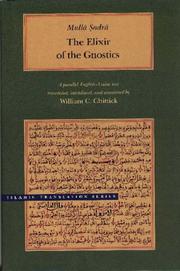| Listing 1 - 10 of 673 | << page >> |
Sort by
|
Book
Year: 1999 Publisher: Istanboul: ISAM,
Abstract | Keywords | Export | Availability | Bookmark
 Loading...
Loading...Choose an application
- Reference Manager
- EndNote
- RefWorks (Direct export to RefWorks)
Book
Year: 1964 Publisher: Leiden: Brill,
Abstract | Keywords | Export | Availability | Bookmark
 Loading...
Loading...Choose an application
- Reference Manager
- EndNote
- RefWorks (Direct export to RefWorks)
Book
ISBN: 9780198823339 0198823339 Year: 2019 Publisher: Oxford: Oxford university press,
Abstract | Keywords | Export | Availability | Bookmark
 Loading...
Loading...Choose an application
- Reference Manager
- EndNote
- RefWorks (Direct export to RefWorks)
This volume presents three of the Epistles of the Brethren of Purity, a monumental work of medieval Islamic learning. Epistle 49 explores the hierarchy of existence; Epistle 50 describes the proper attitudes towards body and soul; Epistle 51 considers the arrangement of the world on numerical principles
Book
ISBN: 9004402128 9649073361 Year: 2019 Publisher: Leiden; Boston : BRILL,
Abstract | Keywords | Export | Availability | Bookmark
 Loading...
Loading...Choose an application
- Reference Manager
- EndNote
- RefWorks (Direct export to RefWorks)
Bahāʾ al-Dīn Iṣfahānī (d. 1137/1725), better known as Fāḍil Hindī, was born into a comfortable home in Isfahan. Being a particularly precocious child, he completed his studies in the traditional and the foreign sciences by the age of thirteen, even carrying the title of mujtahid (someone authorized to issue legal opinions in Shīʿī Islam). He then accompanied his father to the court of the Mughal emperor Awrangzīb (r. 1658-1707), where he remained for several years before returning to Isfahan. At a time at which Isfahan was under the spell of the anti-speculative, literalist Akhbārī school in Shīʿism, Fāḍil Hindī was one of the few to engage in philosophy, so much so that one could call him equally a juristic philosopher or a philosophical jurist. The present work is a very readable, complete course in logic and philosophy that bears witness to his originality as a thinker in each of these domains.
Book
ISBN: 9780199683673 0199683670 Year: 2015 Volume: 445 Publisher: Oxford Oxford University Press
Abstract | Keywords | Export | Availability | Bookmark
 Loading...
Loading...Choose an application
- Reference Manager
- EndNote
- RefWorks (Direct export to RefWorks)
In the history of philosophy, few topics are so relevant to today's cultural and political landscape as philosophy in the Islamic world. Yet, this remains one of the lesser-known philosophical traditions. In this Very Short Introduction, Peter Adamson explores the history of philosophy among Muslims, Jews, and Christians living in Islamic lands, from its historical background to thinkers in the twentieth century. Introducing the main philosophical themes of the Islamic world, Adamson integrates ideas from the Islamic and Abrahamic faiths to consider the broad philosophical questions that continue to invite debate: What is the relationship between reason and religious belief? What is the possibility of proving God's existence? What is the nature of knowledge? Drawing on the most recent research in the field, this book challenges the assumption of the cultural decline of philosophy and science in the Islamic world by demonstrating its rich heritage and overlap with other faiths and philosophies.
Book
ISBN: 0822975661 0822931281 0822984024 Year: 1967 Publisher: Pittsburgh : University of Pittsburgh Press,
Abstract | Keywords | Export | Availability | Bookmark
 Loading...
Loading...Choose an application
- Reference Manager
- EndNote
- RefWorks (Direct export to RefWorks)
Nicholas Rescher presents ten essays that offer the thoughts of major Arabic philosophers in history and speak to their origins in Greek philosophy, as well as the subsequent influence of Arabic philosophy on the West. Much of the material is presented for the first time in print. Topics include: the concentric structure of the universe; the concept of existence; the Theory of Temporal Modalities; the Platonic Solids; and several essays on logic.

ISBN: 0934893705 9780934893701 Year: 2003 Publisher: Provo Brigham Young university press
Abstract | Keywords | Export | Availability | Bookmark
 Loading...
Loading...Choose an application
- Reference Manager
- EndNote
- RefWorks (Direct export to RefWorks)
Sadr al-Din Muhammad Shirazi (1572-1640), more commonly called Mulla Sadra, was one of the grand scholars of later-period Islamic philosophy and has grown to become one of the best-known Muslim philosophers. Iksir al-'arifin, or Elixir of the Gnostics, is unique among Sadra's writings in that it reworks and amplifies an earlier Persian work, the Jawidan-nama (Book of the Everlasting) by Afdal al-Din Kashani, or Baba Afdal.The underlying theme of Sadra's amplification is emblematic of Muslim philosophy: the importance of self-knowledge in an individual's journey of Origin and Return, the soul's origins with God and its eventual return to Him. Everything, Sadra says, is on such a path, gradually disengaging from the material world and returning to a transcendent essence--all leading to a final fruition in which everything in the universe returns to God and finds permanent happiness. Philosophy, Sadra argues, is the most direct means to self-knowledge--and thus the best tool for navigating this journey.
Book
Year: 1958 Publisher: Wiesbaden: Steiner,
Abstract | Keywords | Export | Availability | Bookmark
 Loading...
Loading...Choose an application
- Reference Manager
- EndNote
- RefWorks (Direct export to RefWorks)
Book
Year: 1983 Publisher: Beyrouth: Dār al-Thaqāfa,
Abstract | Keywords | Export | Availability | Bookmark
 Loading...
Loading...Choose an application
- Reference Manager
- EndNote
- RefWorks (Direct export to RefWorks)
Book
Abstract | Keywords | Export | Availability | Bookmark
 Loading...
Loading...Choose an application
- Reference Manager
- EndNote
- RefWorks (Direct export to RefWorks)
| Listing 1 - 10 of 673 | << page >> |
Sort by
|

 Search
Search Feedback
Feedback About UniCat
About UniCat  Help
Help News
News